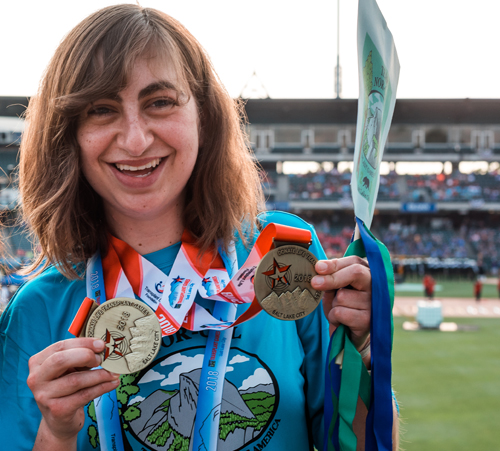By Patricia Danflous

What’s the difference between blue and pink? Kathleen Sheffer can answer that question with exuberance and energy. It’s the difference between living a step away from death and having a second chance for living a full life.
For most of her 27 years Sheffer’s complexion was tinged with blue. Now she is pink, rosy and occasionally celebrates when her skin breaks out–just like a normal, healthy young woman. The color of her life changed July 1, 2016, when she received a heart and double lung transplant.
“I can’t say that I felt great when I came out of the transplant surgery,” the San Francisco native said. “But when my sister showed me a picture of my pink and healthy hand, I knew my life had changed.”
A surgical patient at seven days old, Sheffer’s congenital heart defect would limit and sometimes restrict her life for more than 20 years as her heart worked overtime to keep blood flowing through her body. “Today, surgery can correct the congenital arterial problem I had,” she explained. “I had a repair procedure that had an impact on my lungs with the potential for a heart transplant always a concern.”
You know how easy it is to jump in the shower after exercising or to get ready for a special event? For Sheffer, the process required 30 minutes of preparation and after care. “For 16 years I was on continuous intravenous medications with a central line in my chest,” she noted, explaining that bandaging the area was a precise necessity.
While sitting on the sidelines watching her sister’s success as a competitive swimmer could be disheartening, Sheffer didn’t take time to feel sorry for herself. “I could be competitive in a different way,” she stated. “I focused on academics and even though my parents were nervous and worried, I made my way to the University of California–Berkley, not too far away from home.”
With a degree in Architecture, Sheffer took a detour from that field, turning her sharp appreciation for detail and creative vision toward photography. A highly respected corporate event photographer, her first out-of-town assignment not only acknowledged her talent and reputation but also raised a red flag on her medical problems.
“I flew to Seattle for that first corporate assignment and stayed with a friend from college,” she said. “I woke up in the middle of the night, couldn’t breathe and was soon coughing up blood. My friend called a Seattle hospital hotline and I experienced a 15-day stay in intensive care.”
“This is not good,” she remembered her Stanford doctor explaining when she was able to transfer back home. Sheffer’s condition was rapidly progressing. It was transplant time.
Twenty-eight days later, and sooner than anticipated, she got the call that one family’s loss and the generosity of an organ donation was her lifeline. “I spent the fourth of July holiday recovering from surgery to replace a heart that had worked so hard it was four times the normal size, and lungs that could no longer function. It was a total remodel of my chest area,” she said smiling. “During the days after surgery I also celebrated and silently thanked those I didn’t know for helping me to live,” she emphasized.
The color of her skin is not the only thing that changed post-transplant. “I never imagined how transformative good circulation can be,” Sheffer said. “I can exercise, do laundry and make dinner without stopping to rest every few minutes. I never learned how to exercise because I couldn’t. Now I have started to play tennis and the first Christmas after the transplant I went on a seven-mile hike with my parents in Sedona, Arizona.”
Sheffer’s isn’t just exercising and adding sports to her repertoire of life experiences. She’s winning medals. Two years after her transplant she joined Team NorCal, a group of transplant recipients, living donors, donor families and caregivers, participating in the Transplant Games of America. The highly competitive event showcases the impact of organ, eye, and tissue registration while celebrating life and remembering donors. A member of the badminton, cycling and table tennis teams, she brought home a gold medal in badminton and two gold medals in a cycling competition–racing through the high altitude of Salt Lake City, Utah. “The 2020 Games were canceled due to COVID-19, but I am looking forward to the upcoming games, especially 2022 when they will be in San Diego, close to home,” she said. “I would like to honor my donor by wearing their name on my team shirt, but I have yet to make contact with them. I have written letters of thanks, which the organ procurement agency passes on, but haven’t gotten a response. I may never hear from the donor family, but I do want them to know how grateful I am.”
As an organ recipient, Sheffer fell into the high risk category when COVID-19 made its impact on the world. “Just a few days after we had finished remodeling my childhood home, now my home and studio, the country went into lockdown,” she said. “I am anxious to return to shooting corporate events and had to be a little creative while isolating. Taking photos of food and products is not as much fun as interacting with people, but it is a challenge that is sharpening my techniques.”
Sheffer accepts the gift of life from her unknown donor seriously, making health a priority as well as compliance with COVID guidelines. “I have a responsibility to the donor and their family to take good care of the organs they generously donated,” she said. “I want to stay healthy for all of us.”
To see more and learn more about Kathleen Sheffer, visit her website at www.kathleensheffer.com or find her on Instagram @kathleen.s.photography.



